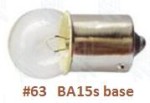Contents: 1. a. Wedge bulbs (all glass, push on)
Contents: 1. b. Festoon bulbs (glass tube, push on)
Contents: 1. c. Screw base bulbs (screw on)
Contents: 2. Bayonet base bulbs (push and turn)
Contents: 3. Plate base headlight bulbs
Contents: 4. Bulb information
Most moped light bulbs are standard automotive bulbs. Most bulbs are made in 6 volt or 12 volt versions, But finding 6V bulbs is difficult since all cars are 12V since the 1970’s. In all of these magneto/generator powered head lights, a 12 volt bulb will replace a 6 volt one, but won’t be as bright.
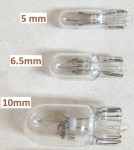
 1a. Miniature All-Glass Wedge Bulbs:
1a. Miniature All-Glass Wedge Bulbs:
044.687 6V 1.2w 5mm wedge Osram $3.00
for Tomos speedos (CEV) late 80’s
ELG74 12V 1.2w 74 5mm wedge Flüsser $3.00
for Tomos speedos (CEV black) 1990 to 2002
6V1.7W 6V 1.7w 10mm wedge N/A
12-1080 12V 3w 194 10mm wedge $1.00 or $5.00 for 10
1b. Festoon Bulbs – look like glass fuses
 For hi-beam indicator inside “bullet” headlight:
For hi-beam indicator inside “bullet” headlight:
20.0908 6V 0.6w 000 6 x 31 SV6 ends $2.00
10626.5 6V 1.5w CEV 8 x 28 SV7-8 ends N/A
For some Euro tail lamps:
14210.00 6V 3w 000 8 x 30 SV8.5-8 ends $2.00
ELB6428 12V 3w CEV 8 x 28 SV7-8 ends $2.00
ELB6428 12V 3w CEV 8 x 31 SV7-8 ends $2.00
14100.0 12V 5w 000 11 x 39 SV8.5-8 ends $2.00
 00000.00 6V 5w 000 11 x 39 SV8.5-8 ends none
00000.00 6V 5w 000 11 x 39 SV8.5-8 ends none
For some Euro head lamps:
000.000 6V 15w 000 15 x 44 SV8.5-8 ends $3.00
200019 12V 10w 000 11 x 44 SV8.5-8 ends $2.00
12V15W 12V 15w 000 11 x 44 SV8.5-8 ends $2.50
 1c. Bulbs with E10 screw base, single contact
1c. Bulbs with E10 screw base, single contact
6V0.6W 6V 0.6w $1.50
for 76-80 Peugeot speedometer
14460 6V 6w yellow $2.00
for early Solex 3800 head light
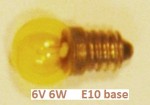
2. Bayonet Base Bulbs
These bulbs have little nubs on the base. You push in and rotate clockwise to install.

![]() Bulbs with BA7s base, 7mm bayonet single
Bulbs with BA7s base, 7mm bayonet single
10632.1 6V 0.6w CEV N/A use 7V 0.7W
7V0.7W 7V 0.7w $1.00
6V1.0W 6V 1.0w $1.50
ELB1262 6V 1.5w $1.50
ELB3898 12V 2w $1.50
for 78-80 Motobecane/03-07 Tomos/other VDO
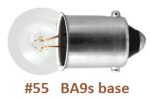 Bulbs with BA9s base, 9mm bayonet single
Bulbs with BA9s base, 9mm bayonet single
6V0.8W 6V 0.8w 47 $1.50 long glass
200002 6V 1.5w 51 $2.00 small glass
6V2.0W 6V 2w $1.00 small glass
6V4.0W 6V 4w $2.50 long glass
 200003 12V 2w 53 $1.50 small glass
200003 12V 2w 53 $1.50 small glass
200004 12V 2w 53 $1.50 long glass
for 1987-on Tomos turn or hi beam indicator
12V3W 12V 3w 57 N/A large glass
ELB3893 12V 4w Everglo $2.50 long glass
1423000 12V 4w xxxxxx $2.00 small glass
BA15s base, 15mm bayonet single, small glass
ELB5006 6V 5w 63 $2.00
for 77-later Puch, must have this to be bright
6V8W 6V 8w 00 $2.50 for Cateye turn sig.
ELB5001 6V 10w 81 $2.00
ELB57 12V 5w 67 $1.50
SAE97 12V 8w 97 $1.50
ELB89 12V 10w 89 $1.50
 BA15s base, 15mm bayonet single, large glass
BA15s base, 15mm bayonet single, large glass
SAE87 6V 12w 87 N/A
H101C 6V 21w 1129 $2.00
6V24W 6V 24w 1133 $2.00 very large glass
12V12W 12V 12w 1003 $1.50
12V21W 12V 21w 0000 $1.50
ELB1156 12V 26w 1156 $2.00
12V32cp 12V 32cp 1073 $1.50 12V 20w approx.
 BA15d base, 15mm bayonet two-contact, equal nubs
BA15d base, 15mm bayonet two-contact, equal nubs
2-filament kinds conduct through the shell, like most bulbs.
6V15.15w 6V 15/15w N/A 2-filaments 2-contacts
12V21.6c 12V 21/6cp 1176 $2 2-filaments 2-contacts
12V17.5w 12V 17/6w 1158 $3 2-filaments 2-contacts
for most 1950’s car’s turn/brake/tail light. Obsolete.
1-filament kinds do not conduct through the metal shell.
12V4cp 12V 4cp 1178 N/A 1-filament, 2-contacts
 BAY 15d base, 15 bayonet 2-contacts, unequal nubs
BAY 15d base, 15 bayonet 2-contacts, unequal nubs
10630.1 6V 15/3w CEV $2.00
10630.3 6V 18/3w CEV N/A
for Vespa Ciao tail light
ELB1154 6V 21/5w 1154 $2.00
ELB1157 12V 27/8w 1157 $1.00 box of 10 $6.00
24V216c 24V 21/6cp $1.50
 BA20d base, 20 bayonet 2-contacts, unequal nubs
BA20d base, 20 bayonet 2-contacts, unequal nubs
6V25.25 6V 25/25w $12.00
for Derbi Variant Sport 1986-89
20-0018 12V 35/35w Narva $5.00
for Tomos Revival/Streetmate
044.701 12V 25/25w $5.00
for Tomos ’90-on, square HL, ’95-05 Kinetic TFR
3. Plate Base Headlight Bulbs
These are all for head lights, for higher power and precise focus.
P15d (P15d-1) 15×30 “3-hole plate” double 
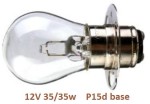
6V25.25 6V 25/25w P15d base $12
500310 12V 35/35w P15d base $12
12V5050 12V 50/50w P15d base $10
 P15d-3 base, 15×25 “3-tab plate” double
P15d-3 base, 15×25 “3-tab plate” double
12V35.35 12V 35/35w P15d-3 base N/A
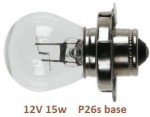 P26s base, 15×26 “stepped plate” single
P26s base, 15×26 “stepped plate” single
C-1432 6V 15w P26s base $3.00
for 1984-86 Puch with square Niox headlight
and for many 60’s-70’s non-US-model mopeds
20-0023 12V 15w P26s base $8.50
for Tomos Arrow-R and Streetmate-R (dual HL)
 PX15d base, 15×24 “plain plate” double
PX15d base, 15×24 “plain plate” double
632729 6V 15/15w PX15d base N/A
632787 12V 15/15w PX15d base $7
632843 12V 18/18w PX15d base N/A
633905 12V 25/25w PX15d base N/A
4. Bulb Info
Mopeds frequently burn out bulbs, from both vibration and surges of electricity. Because there’s no battery, the voltage varies a little. At idle the lights are very dim, but at full speed they’re bright. Hopefully they’re not bright white, as that means they might burn out soon. Yellow is good but orange is too dim.
Head light: For some reason, many old 6 volt mopeds need 12 volt bulbs, or else they burn out. Some might even need a 12V AC voltage regulator ($25) added on in addition to 12V bulbs, to help prevent bulb burn out. All 6 volt mopeds can use 12 volt headlight bulbs, but the headlight is dimmer. On most 6 volt mopeds (with head and tail powered by same wire) using 12 volt headlight bulbs, the tail light is brighter. On some 6 volt mopeds using 12 volt headlight bulbs, the tail light is dimmer.
Tail light: European mopeds with 4-coil Bosch 90mm magnetos, like 1977-86 Puch, or 1977-79 Batavus, need a 6V 21W headlight bulb instead of a 12V 26W #1156, in order for the tail lite to be bright.
Brake light: Some bikes have issues where the brake light is needed for the ignition to function. On those with a single 2-filament bulb, they might loose spark when the brakes are applied with a 12 volt #1157 bulb. Then they need a 6 volt #1154 light bulb. On those with two 1-filament bulbs and a secret hidden resistor inside (connected in parallel with the brake light), they normally do not loose spark when the brake light bulb is wrong, burned out, disconnected or missing. See tail lights.
Battery power: Large motorcycles and cars have headlights powered by battery. With a battery the voltage is steady and limited. Those lights do not burn out often (except maybe from vibration). When several lights are powered by one battery wire, and one of them burns out, the others are normally not affected.
Generator power: Small motorcycles and mopeds have headlights powered by generator. With a generator the voltage rises and falls with engine speed, and can become too high at times. When several lights are powered by one generator wire, and one of them burns out, the others get more voltage and become brighter. Then soon they also burn out from that over-voltage. For example, you are riding along and you speedometer light suddenly gets brighter. That might mean your tail light just burned out, and soon the head and speedometer light will follow.
Watts matching: With generator power and without a solid-state voltage regulator, for each generator output wire, the total watts of all the bulbs powered by that wire must match the rated watts of that generator output. Generators (magnetos) usually have more than one lighting output. For example a 1977 Batavus has a 6-wire Bosch magneto with 3 lighting outputs 6V 5W (for 6V 5W bulb), 6V 10W (for 6V 10W bulb), and 6V 22W (for 6V 21W plus 6V 1.5W bulbs). When the correct bulbs are used, the watts match. Then the lights are not too bright going fast, and not too dim going slow.
Voltage regulation: Bulb watts matching and multiple lighting outputs became obsolete in the 1980’s with the advent of low-cost efficient and reliable solid-state (electronic) voltage regulation. A regulator makes the generator behave like a battery, with a maximum voltage limit. Some makes had this earlier in the 1970’s, like Motobecane. Under the headlight was a 2 inch box with cooling fins. A thing that looks like a 80’s power transistor is screwed into it. It is actually a dual zener power diode, that regulates in both directions for AC, in this case 6 volt. It limits the voltage to below about 7 VAC. Almost all modern AC voltage regulators are 12 volt, since 6 volt equipment also became obsolete in the 1970’s and 80’s.
